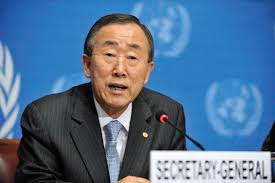The outgoing UN Secretary-General Ban Ki-moon has warned that the failure of the international community to act now could put the South Sudan on a trajectory towards mass atrocities.
Ban, who gave the warning while addressing the Security Council, reported growing tensions and increasing despair among South Sudan’s people.
“It is time to put the people of South Sudan, and not its leaders, at the forefront of any strategy.
“We should be united and determined in following through with severe consequences for those who impede the path to peace and stability,” the secretary-general said.
The UN chief informed the Council of reports suggesting that South Sudanese President Salva Kiir and his loyalists are contemplating a new military offensive in the coming days against the Sudan People’s Liberation Movement (SPLM)-In Opposition.
He said the report added that long-time rival and former Vice President Riek Machar and other opposition groups are pursuing a military escalation.
Ban underscored that the parties in South Sudan must be prevented from launching any military operation, particularly with the beginning of the dry season.
“I urge the Council, regional leaders and the international community to make it clear to President Kiir and Riek Machar that initiation of a military offensive will carry serious consequences,” he appealed.
He reiterated his call for an arms embargo, saying such a measure “would diminish the capacity of all sides to wage war”.
He sounded the alarm at the rising ethnic tensions in the country, including increasing hate speech from many in leadership positions as well as the warning from Adama Dieng, the UN Special Envoy for the Prevention of Genocide.
“I am afraid that process is about to begin unless immediate action is taken.
“The Council must send a clear warning that hate speech, incitement and violence must end, and that there will be accountability for mass atrocities and other crimes.”
He also told the Council that the UN Mission in South Sudan (UNMISS) continued to face serious restrictions on its freedom of movement throughout the country, and called on the Government to fulfil its pledges of unconditional acceptance of the deployment of the Regional Protection Force.
“Words alone are insufficient.
“They must be matched by practical actions that demonstrate a strategic shift to fully cooperate with the United Nations and all partners for peace,” he noted.
Ban regretted that the people of South Sudan had suffered far too much, for far too long.
“Its people will be the target of those atrocities while they pin their hopes on the international community in general and the Security Council.
“I appeal to the Security Council to act, to act now, in fulfillment of its responsibility and in support of ongoing regional efforts,” the secretary-general stressed.
Stephen O’Brien, head of the UN Office for Coordination of Humanitarian Affairs (OCHA), while also briefing the Council, stressed that decisive action was needed to end the violence and that it was incumbent upon the Security Council to make sure the necessary action is taken.
O’Brien drew the attention of the Council to the challenges faced by aid workers in South Sudan.
“I am appalled to highlight that around 67 per cent of the incidents of violence against humanitarian workers or assets.
“Last month, one hundred reports of humanitarian access incidents were documented, the highest number in any month since June 2015.
“The situation is particularly difficult in locations where towns are controlled by one party to the conflict and surrounded by another.
“For instance, in Yei (Central Equatoria province) and in Wau (Western Bahr el Ghazal province) tens of thousands are estimated to be in need of humanitarian assistance.
“The recent proliferation of armed actors has increased the complexity of access negotiations and heightened risks to aid workers,” he said.
He urged the Council to take immediate action on cessation of violen

